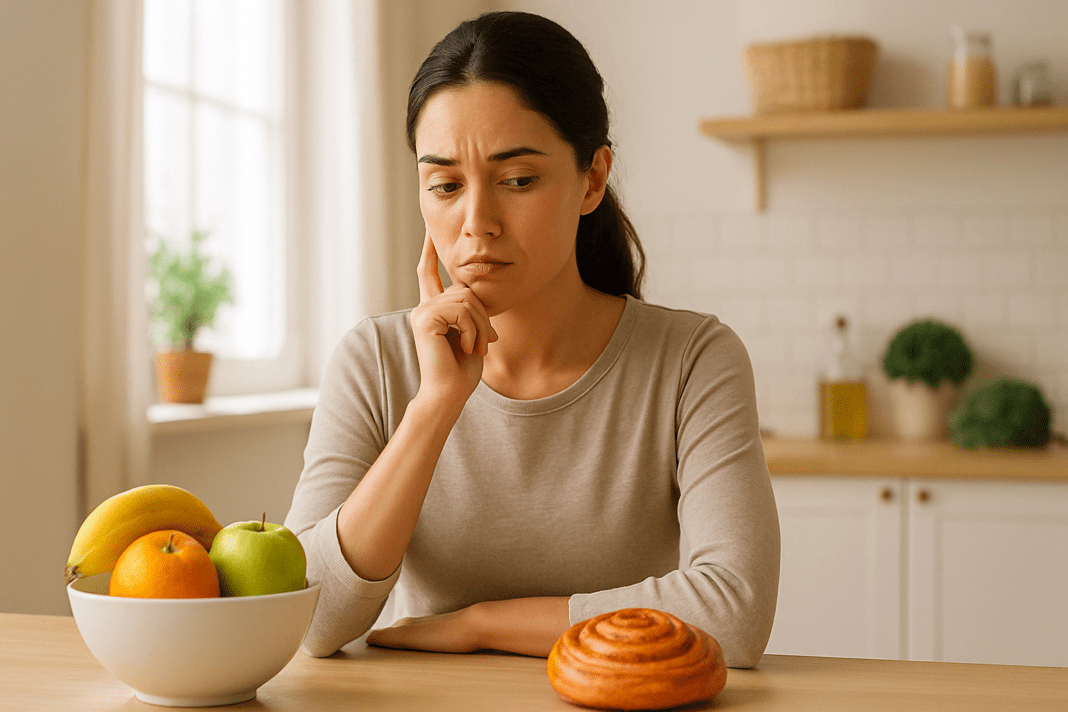Have you ever found yourself suddenly overcome with the urge to eat something sweet, even when you’re not particularly hungry? If you’ve been asking yourself, “Why am I craving sweets all of a sudden?” you’re not alone. Sugar cravings are incredibly common, yet their root causes can vary widely from person to person. For some, it’s an occasional indulgence. For others, it may feel more like a persistent, uncontrollable need—especially if you find yourself craving cake for months or reaching for sugary snacks every night.
The good news is that sugar cravings are not merely about willpower. They often stem from physiological imbalances, emotional stressors, poor sleep, or dietary gaps. In fact, understanding the craving sugar meaning from a biological and psychological standpoint is the first step toward regaining control. Whether your cravings are sudden or ongoing, tied to stress, lack of sleep, or post-meal habits, this article unpacks the real science behind sugar cravings and offers practical, expert-approved advice on how to stop sugar cravings naturally and effectively.
You may also like: The Best Food Online Delivery Options for Healthy Eating: How to Choose Nutritious Meals from Services You Can Trust
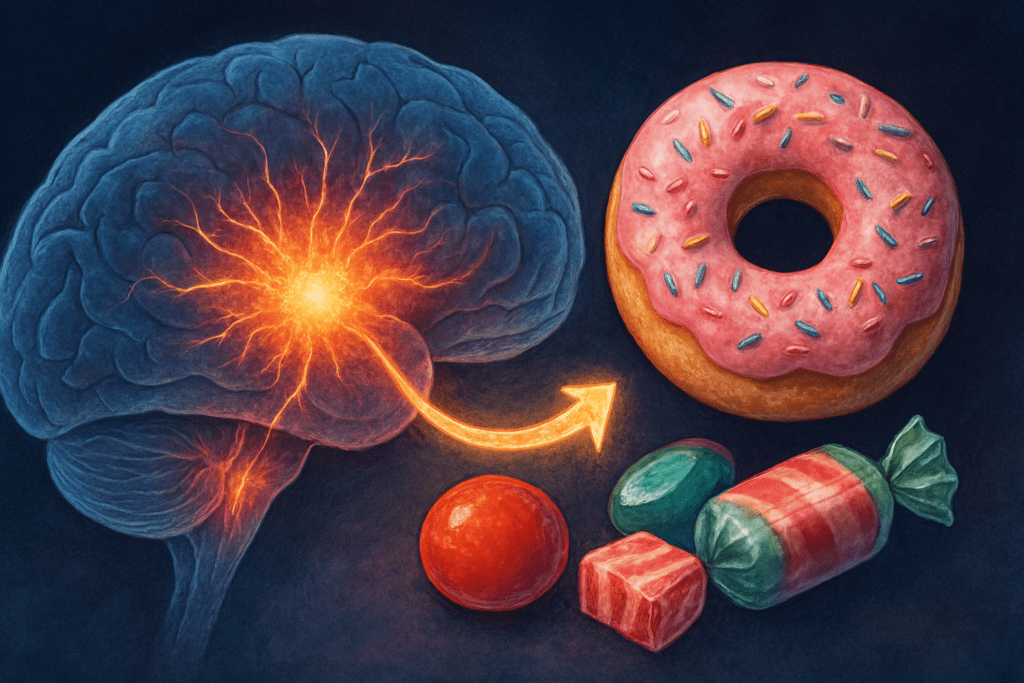
Understanding the Biology of Sudden Sugar Cravings
At a biological level, sugar cravings are tied closely to the brain’s reward system. Eating sugar activates the release of dopamine—a neurotransmitter associated with pleasure—which creates a temporary feeling of satisfaction. This powerful feedback loop explains why so many people struggle with how to curb sugar cravings once they’ve started. Even a small taste of something sweet can make the brain crave more, creating a cycle that becomes increasingly difficult to break.
Sudden sugar cravings can also result from fluctuations in blood glucose levels. When your blood sugar drops quickly—due to skipping meals, eating high-glycemic foods, or experiencing stress—your body seeks a quick source of energy. Sugar, being fast-digesting, is an easy solution. But the catch is that it only offers a short-lived fix, often followed by a crash that triggers more cravings. This explains why some people experience sugar cravings after eating, especially if their meals are lacking in protein or fiber.
Additionally, hormonal imbalances involving insulin, cortisol, leptin, and ghrelin can contribute to this phenomenon. Stress-induced cortisol spikes lead to increased appetite and a preference for high-sugar foods. When ghrelin (the hunger hormone) is elevated—such as after a poor night’s sleep—and leptin (the satiety hormone) is suppressed, your ability to regulate food intake weakens. This hormonal chaos can drive intense sugar cravings at night, even after you’ve consumed a full dinner.
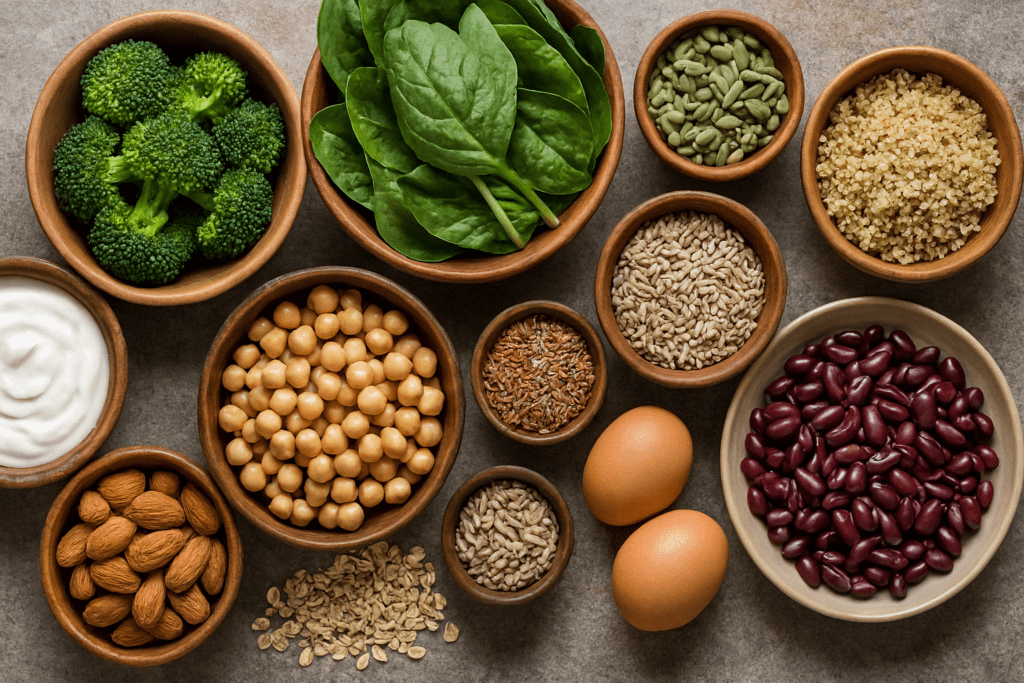
Could a Nutrient Deficiency Be Causing Your Cravings?
A lesser-known but significant cause of sugar cravings is micronutrient deficiency. Many people are surprised to learn that consistent cravings for chocolate may be tied to low magnesium levels. Magnesium plays a key role in energy production, blood sugar regulation, and nerve function, and a deficiency can manifest as a persistent need for sweets. If you’ve been craving cake for months, consider evaluating your magnesium intake.
Chromium and zinc are two other minerals linked to glucose metabolism. A lack of these nutrients can impair your body’s ability to use insulin efficiently, leading to unstable blood sugar levels and, subsequently, sugar cravings. B-vitamin deficiencies—particularly B6 and B12—can also cause fatigue and low mood, both of which can increase the likelihood of emotional eating and craving sugar all of a sudden.
Protein and fiber deficiencies are another overlooked contributor. Meals that lack these components often leave you feeling unsatisfied, increasing the chances of craving sweets after eating. When your body doesn’t get the nutrients it needs, it often seeks out fast energy—most commonly, sugar. Understanding what to eat if craving sweets starts with choosing whole foods rich in protein, healthy fats, and complex carbohydrates to nourish your body properly.
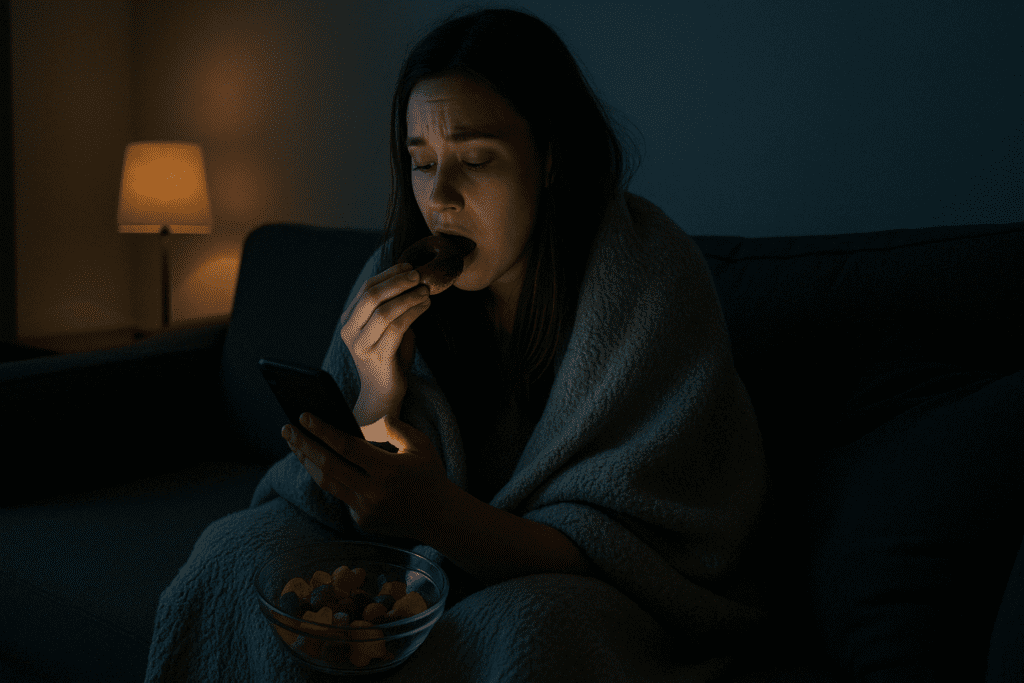
The Emotional and Psychological Side of Sugar Cravings
Sugar is not just a fuel source—it’s also a comfort food. Emotional eating is a major driver of sugar consumption, and it’s not hard to see why. When you’re sad, stressed, or bored, your brain seeks relief. Sugar activates the brain’s reward circuitry, temporarily improving mood by boosting serotonin and dopamine levels. But this short-lived high is often followed by guilt, fatigue, or more cravings.
For individuals dealing with stress or anxiety, the desire to eat sweets may be more about soothing emotional discomfort than satisfying hunger. This dynamic is especially common in those who experience sugar cravings and tiredness—a sign that your cravings might be tied to more than just physical energy needs. If you find yourself regularly craving sweets at night or turning to sugar as a way to unwind, emotional eating could be a primary factor.
These patterns can become deeply ingrained, particularly if sweets were associated with reward or love during childhood. If you often feel like you only want sweets at night, this may reflect not just a biological rhythm, but also a psychological habit or coping mechanism. Overcoming emotional eating starts with awareness and emotional literacy. Recognizing the underlying emotions driving your cravings can be the first step toward healthier, more sustainable coping strategies.
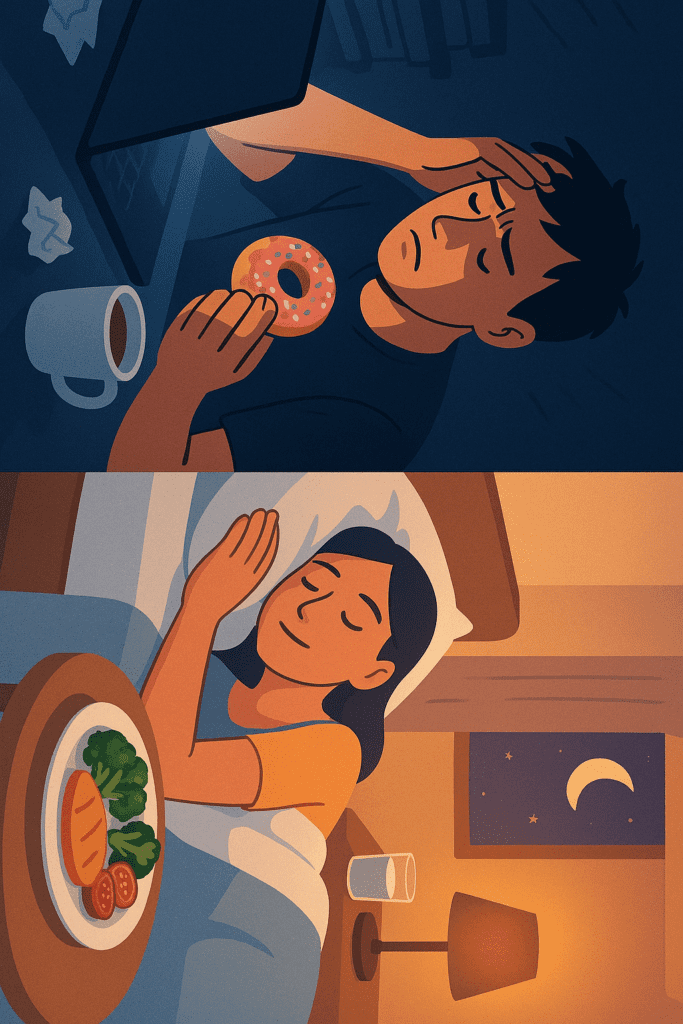
Sleep Deprivation, Stress, and Lifestyle Factors That Fuel Cravings
If you’ve been waking up craving sugar or experiencing strong urges for sweets late at night, poor sleep may be to blame. Inadequate rest interferes with your body’s natural hunger and satiety hormones. Ghrelin levels rise while leptin levels fall, increasing appetite and making sugary foods more appealing. At the same time, sleep loss reduces your cognitive control and decision-making abilities, making it harder to resist temptations.
Chronic stress has a similar effect. When cortisol levels remain high over extended periods, your body enters a state of constant alertness, leading to sugar cravings as a quick source of energy and relief. If you’re asking yourself, why am I craving sweets all of a sudden during high-pressure periods, stress is likely playing a central role. The hormonal fluctuations that accompany stress can increase both your desire for and your sensitivity to sugary foods.
Sedentary behavior, irregular meal patterns, and high caffeine consumption can further intensify cravings. Lack of physical activity reduces insulin sensitivity, while erratic eating patterns cause fluctuations in blood sugar that prime your body to seek quick energy from sugar. If you notice constant craving sugar after a meal or craving sugar at night time, evaluating your sleep hygiene and daily habits is an essential step toward regaining balance.

Medical Reasons for Sugar Cravings You Shouldn’t Ignore
Sometimes, sugar cravings can be a symptom of an underlying medical issue. If you’ve been craving sweets for months without a clear explanation, it’s worth exploring whether conditions such as insulin resistance, hypoglycemia, thyroid dysfunction, or even depression could be contributing factors. For example, insulin resistance impairs your cells’ ability to absorb glucose, prompting your body to crave more sugar in an attempt to regulate energy.
Low thyroid function can also cause fatigue and low energy, driving a need for quick fuel sources like sugar. Similarly, adrenal fatigue or chronic fatigue syndrome may lead to sugar cravings and tiredness throughout the day. Certain medications, such as antidepressants, antipsychotics, and steroids, can alter appetite and glucose metabolism, increasing sugar cravings.
If you’re frequently craving sugar all of a sudden or experiencing sugar cravings alongside symptoms like brain fog, weight gain, or mood instability, consult a healthcare professional. In these cases, simply learning how to stop craving sweets may not be enough—you’ll also need to treat the underlying cause.
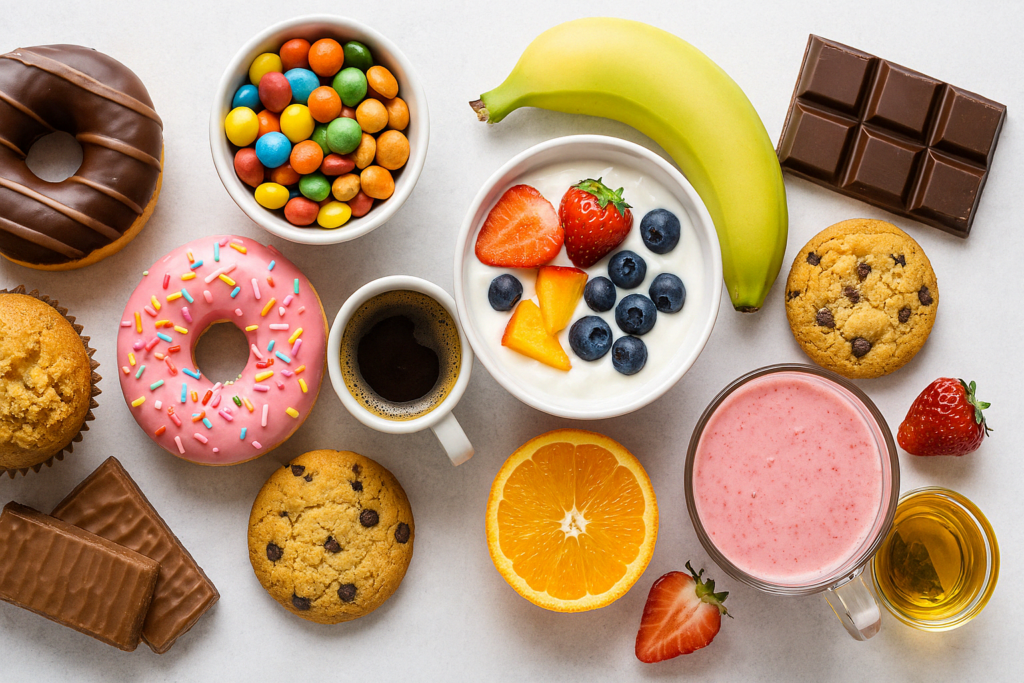
How to Break Sugar Addiction Without Feeling Deprived
Successfully learning how to break sugar addiction starts with realistic goals and sustainable habits. The first step is to remove hidden sugars from your diet—these are often found in processed foods, sauces, dressings, and snacks. Reading labels and becoming more mindful of ingredient lists can drastically reduce your intake without feeling overly restrictive.
Gradual reduction works better than going cold turkey for most people. Start by replacing ultra-processed sweets with naturally sweet alternatives like fresh fruit, dates, or yogurt with cinnamon. As your taste buds adapt, you’ll likely find that you crave sugar less frequently and are more satisfied with naturally sweet foods. This shift helps support your goal of how to stop sugar addiction in a way that feels achievable.
Incorporating sugar craving blockers such as fiber-rich foods, fermented vegetables, herbal teas, and healthy fats into your daily meals can also help reduce dependence. These foods balance blood sugar, promote satiety, and reduce the likelihood of sugar binges. Supplementation with magnesium, B-vitamins, or chromium may also assist in stabilizing mood and reducing cravings—though always consult a medical professional before beginning any supplement regimen.
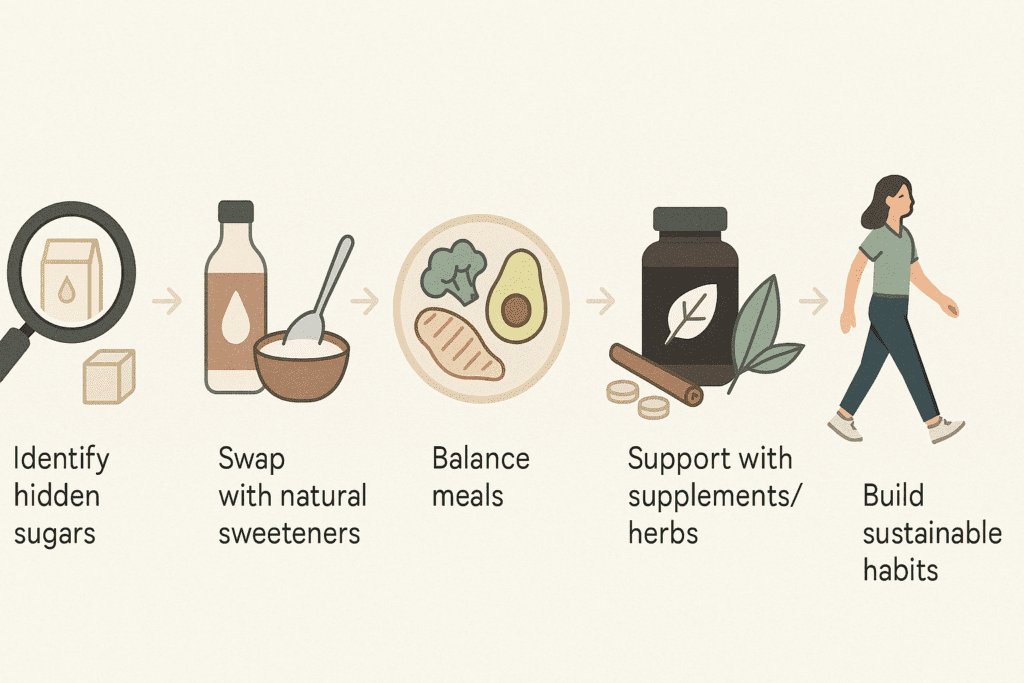
What to Eat If Craving Sweets: Smart Swaps and Satisfying Solutions
When you’re trying to reduce your intake of added sugars, it helps to know exactly what to eat if craving sweets. Start by incorporating fiber-rich whole fruits such as apples, pears, or berries. These offer natural sweetness along with vitamins, antioxidants, and fiber to slow sugar absorption and stabilize your energy.
Pairing fruit with a protein or healthy fat—like almond butter, Greek yogurt, or a handful of nuts—can further balance your blood sugar and keep you full longer. If you’re feeling sluggish and reach for sugar in the afternoon, opt for a smoothie with spinach, banana, chia seeds, and plant-based protein powder. These satisfying choices can address craving sugar after meal episodes by preventing blood sugar dips.
Herbal teas like cinnamon, licorice, or peppermint can help reduce the desire for dessert. These teas not only satisfy the need for flavor but also support digestion and mood. Over time, building a menu of foods that stop sugar cravings can retrain your body to prefer stable energy sources and reduce reliance on quick fixes.
Frequently Asked Questions: Understanding and Managing Sudden Sugar Cravings
1. Why am I craving sweets all of a sudden, even though my diet hasn’t changed? Sudden sugar cravings can often appear even when your diet remains consistent because of changes in stress, sleep patterns, or hormonal fluctuations. When you ask yourself why am I craving sweets all of a sudden, it’s important to look beyond food alone. Cortisol, the body’s primary stress hormone, can spike during emotional or physical stress, leading to increased sugar-seeking behavior. Additionally, disruptions in circadian rhythm—due to jet lag, shift work, or inconsistent sleep—can alter how your body regulates appetite hormones like ghrelin and leptin. These changes can drive powerful, seemingly random urges for sugar even in the absence of dietary shifts.
2. Why do I crave sugar after a meal if I just ate? If you’re constantly wondering why I crave sugar after a meal, the issue may stem from how your meal was composed rather than how much you ate. Meals that are high in refined carbs and low in protein or fiber can cause rapid spikes and crashes in blood glucose, leaving you unsatisfied and triggering sugar cravings. Another factor is conditioned reward patterns: if you’ve grown up associating dessert with the end of a meal, your brain might habitually expect something sweet. Additionally, poor gut health can alter taste preferences and increase cravings for sugar-rich foods post-meal. Optimizing macronutrient balance and supporting digestive health may reduce these post-meal sugar cravings.
3. What does it mean if I’ve been craving cake for months without relief? Persistent cravings, such as asking why am I craving cake for months, may signal a deeper imbalance. This could include nutritional deficiencies (e.g., magnesium or B-vitamins), long-term emotional stress, or dysbiosis in the gut microbiome, where sugar-loving bacteria like Candida flourish. It may also point to chronic sleep deprivation or unmanaged insulin resistance, both of which heighten the appeal of high-glycemic foods. If your cravings have lasted for weeks or months, it’s worth exploring medical reasons for sugar cravings with a qualified practitioner who can run appropriate tests and provide targeted recommendations.
4. Why do I only want sweets at night when I’m more tired? It’s a common concern: why do I only want sweets at night? The body’s circadian rhythm affects energy regulation and appetite cues, often causing energy dips in the evening. If you’re not eating balanced meals throughout the day, or if you’re under chronic stress, your body may be primed to seek fast-acting glucose sources at night. Late-night screen use can also disrupt melatonin and insulin sensitivity, further intensifying sugar cravings at night. To minimize craving sugar at night time, consider front-loading your nutrition with fiber, protein, and healthy fats earlier in the day while reducing electronic exposure before bed.
5. Are there foods that stop sugar cravings naturally? Yes, there are several foods that stop sugar cravings by supporting stable blood sugar and promoting satiety. These include high-fiber fruits like apples and pears, protein-rich snacks such as hard-boiled eggs or hummus, and healthy fats from nuts, seeds, and avocados. Fermented foods like kimchi or sauerkraut may help by enhancing gut health and reducing sugar-loving microbial overgrowth. Incorporating these foods strategically throughout the day can serve as a natural sugar craving blocker, helping you respond to cravings with nourishment instead of indulgence.
6. How do I break sugar addiction when it feels so overwhelming? For many, the journey of how to break sugar addiction begins with reducing hidden sugars in processed foods rather than attempting to quit cold turkey. Gradual tapering reduces withdrawal-like symptoms and minimizes rebound cravings. Building meals with consistent macronutrient balance—especially emphasizing fiber and protein—helps minimize blood sugar swings. Behavioral strategies like journaling, breathwork, and habit stacking can reinforce your motivation when cravings strike. Most importantly, learning how to stop sugar addiction includes self-compassion: it’s not about perfection but about progress.
7. Why am I waking up craving sugar even though I had dinner? If you frequently wake up craving sugar, your body may be reacting to poor sleep quality, overnight hypoglycemia, or high stress levels upon waking. Cortisol naturally rises in the morning, and if paired with low blood sugar from an unbalanced or early dinner, it can drive you to crave sweets as a fast energy source. Night sweats, light sleep, or sleep apnea may also contribute to this phenomenon. To address waking up craving sugar, consider adding a protein-rich bedtime snack and ensuring adequate magnesium intake to support deep, restorative sleep.
8. What are some effective ways to stop craving sweets without relying on willpower alone? Understanding how to stop craving sweets requires more than just resisting temptation—it’s about changing the environment and addressing root causes. Identifying emotional triggers, limiting processed foods at home, and prepping nourishing snacks in advance can prevent reactive choices. Techniques like mindful eating, urge surfing, and cognitive reframing have been shown to rewire how we respond to craving sweets. Including structured meal times can further stabilize hunger hormones and reduce impulsive eating. Long-term strategies focused on consistency—not restriction—are the most effective way to curb sugar cravings sustainably.
9. Could medical conditions be the reason why I am craving sugar so intensely? Absolutely. If you’ve been wondering why I crave sugar with unusual intensity or frequency, it could be related to blood sugar dysregulation, thyroid imbalances, or even side effects of certain medications. For example, antidepressants and corticosteroids can influence appetite and glucose metabolism, making sugar cravings after eating more common. Polycystic ovary syndrome (PCOS) and adrenal fatigue may also increase susceptibility to craving sugar all of a sudden. Consulting a healthcare provider for blood tests can help identify medical reasons for sugar cravings that might otherwise go unnoticed.
10. How can I curb sweet cravings in a social setting where sugary foods are everywhere? Learning how to curb sweet cravings in social environments involves preparation and intention. Eating a fiber- and protein-rich meal before attending events can reduce physical hunger and buffer against temptation. Bringing a healthier dessert option can ensure you’re not left without alternatives. Mentally rehearsing how you’ll handle offers for sweets allows you to respond confidently and mindfully. Social reinforcement can also be powerful—let others know about your goals so they can support you. Over time, these strategies build resilience, helping you curb sugar cravings even when the environment isn’t ideal.
Conclusion: Understanding Sugar Cravings and Finding Freedom in Balance
Craving sweets—especially suddenly or persistently—is not a sign of weakness, but rather a signal from your body and mind that something may be out of balance. Whether you’re trying to decode why am I craving sugar all of a sudden, battling late-night urges, or searching for sustainable ways to stop sugar cravings naturally, knowledge is your greatest ally.
By addressing nutritional deficiencies, managing stress, improving sleep, and making mindful food choices, you can significantly reduce the intensity and frequency of cravings. For those navigating more chronic patterns—like sugar cravings at night or craving cake for months—the journey may also include examining deeper emotional patterns and seeking medical support when necessary.
Ultimately, learning how to curb sweet cravings and how to break the sugar habit is about creating a relationship with food that is grounded in awareness, nourishment, and self-compassion. With small, consistent changes, you can move from reactive eating to intentional living—freeing yourself from sugar’s grip and embracing a healthier, more balanced lifestyle.
Was this article helpful? Don’t let it stop with you. Share it right now with someone who needs to see it—whether it’s a friend, a colleague, or your whole network. And if staying ahead on this topic matters to you, subscribe to this publication for the most up-to-date information. You’ll get the latest insights delivered straight to you—no searching, no missing out.
Further Reading:
Why You’re Always Craving Sugar—Plus, Expert Tips on How to Stop
13 Ways to Fight Sugar Cravings
How to Stop Sugar Cravings in 3 Steps
Disclaimer
The information contained in this article is provided for general informational purposes only and is not intended to serve as medical, legal, or professional advice. While NewsHealthWatch strives to present accurate, up-to-date, and reliable content, no warranty or guarantee, expressed or implied, is made regarding the completeness, accuracy, or adequacy of the information provided. Readers are strongly advised to seek the guidance of a qualified healthcare provider or other relevant professionals before acting on any information contained in this article. NewsHealthWatch, its authors, editors, and contributors expressly disclaim any liability for any damages, losses, or consequences arising directly or indirectly from the use, interpretation, or reliance on any information presented herein. The views and opinions expressed in this article are those of the author(s) and do not necessarily reflect the official policies or positions of NewsHealthWatch.

